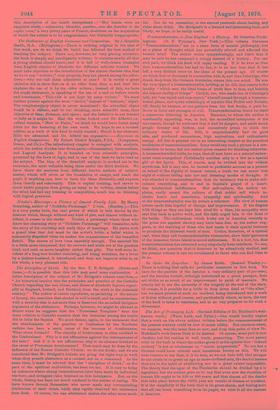The Rudiments of English Grammar and Composition. By J. Hamblin
Smith, M.A. (Rivingtons.)--There is nothing original in the plan of
this work, nor do we think Mr. Smith has followed the best method of teaching the subject. There are, however, no very glaring mistakes, the book is simply and intelligently written ; it contains nearly all that a young student should know, and it is full of well-chosen examples from English classics to illustrate the different subjects treated. We must take objection to the introduction of the almost obsolete idea that we have any " articles ;" very properly, they are placed among the adjec- tives,—why not call them adjectives at once ? It is surely a great omission not to show that an is an older form than a, and that this explains the use of it by the older 'writers; instead of this, we have the crude statement, in speaking of the use of a and an before vowels and consonants, "This rule is not kept by some writers." We must further protest against the term "dative," instead of "indirect," object. The complementary object is never mentioned ; the adverbial object would be a shorter, and to our thinking, more scientific term, than objective of time, distance, and space ; and the infinitive is not treated so billy as it might be. Had the writer looked over Dr. Abbott's ex- cellent treatise, "How to Parse," we think he would have found many hints for the bettering of his own work. We hope to see a revised edition, as a work of this kind is really wanted ; Morell is too abstruse, Hills too advanced, and Dr. Abbott too expensive.—Exercises in English Composition. By Robert Shekel Knight, F.S.L. (Longmans, Green, and Co.)—The introductory chapter is occupied with analysis, which the author divides into three parts,—Grammatical, Intermediate, and Logical Analysis. It is founded on true scientific principles, governed by the laws of logic, and is one of the beat we have read on the subject. The idea of the threefold analysis is worked out in the exercises, the most valuable being those under the third division. We have there the analyses from different known authors of subject- matter, which will serve as the foundation of essays, and teach the pupil, if anything can, how to form his ideas distinctly, and express them clearly and coherently. This is capital training, and serves to much better purpose than giving an essay to be written, almost before the mind has had any training in composition, much less in thinking with logical precision.






























 Previous page
Previous page